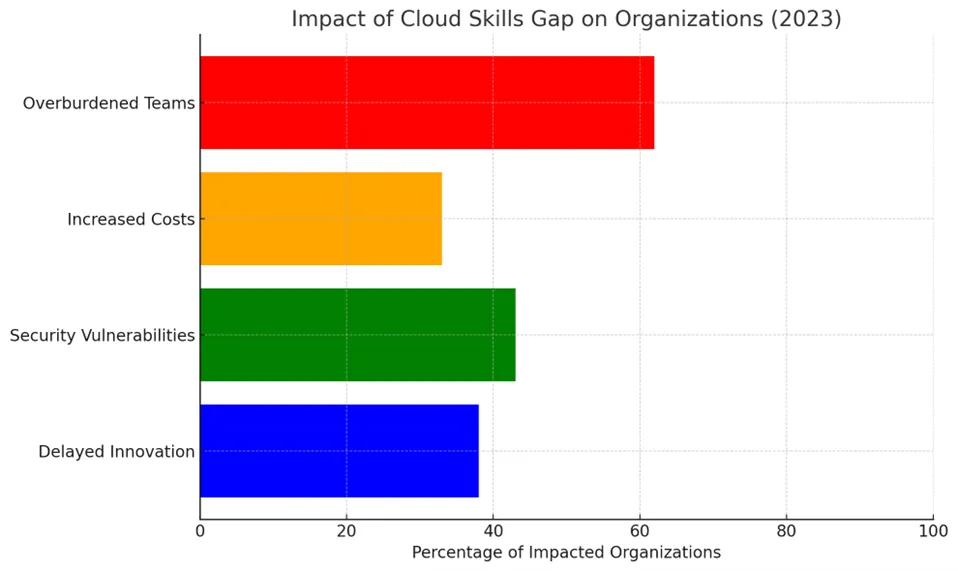Table of Contents
As cloud computing becomes an integral part of business operations, the shortage of professionals with the necessary cloud skills is creating a significant barrier. This cloud skill set gap is affecting organizations in various ways, delaying digital transformation projects, increasing security vulnerabilities, and stalling innovation. Reports from leading cloud providers like AWS, Microsoft Azure, and Google Cloud highlight the urgent need for organizations to address this gap in order to realize the full potential of their cloud investments.
The Extent of the Cloud Skills Gap
In 2023, Microsoft Azure’s research revealed that the global cloud talent shortage had reached alarming levels, with over 50% of organizations reporting that they lacked the necessary skills in cloud security, governance, and architecture. Similarly, AWS reports indicate that 90% of organizations use cloud services, yet many struggle to optimize them due to gaps in their teams’ skills. This mismatch between cloud adoption and available talent is leading to significant challenges for businesses.
According to Google Cloud, one of the key areas where this gap is most apparent is in the management of multicloud environments. As more businesses adopt hybrid and multicloud strategies, they find it increasingly difficult to source professionals with the expertise needed to handle the complexities of multiple platforms simultaneously.

How the Cloud Skills Gap Affects Organizations
1. Delayed Innovation
Lacking skilled cloud professionals, many organizations are unable to take full advantage of cutting-edge cloud technologies. Over 38% of businesses have missed key performance indicators (KPIs) related to cloud-driven innovations, delaying the rollout of new services and technologies. For companies that depend on rapid innovation to maintain a competitive edge, these delays can lead to lost revenue and reduced market share.
2. Security Vulnerabilities
One of the most critical impacts of the skills gap is the increased risk of security breaches. AWS reports that 43% of organizations have experienced difficulties maintaining up-to-date cloud security measures, leaving them vulnerable to cyberattacks. Without skilled professionals to configure and monitor security protocols effectively, organizations face heightened risks of data breaches and compliance violations.
3. Increased Costs
As organizations struggle to fill the skills gap internally, many turn to external solutions such as managed service providers (MSPs). While this can offer short-term relief, it also leads to higher operational costs and long-term dependency on third-party services. Companies that fail to build internal cloud expertise may find their operational budgets strained by the ongoing need for external assistance.
4. Overburdened Teams
The cloud skills shortage also places a significant strain on existing IT teams. With fewer skilled professionals available, workloads are increasing, and teams are under constant pressure to manage complex cloud infrastructure without the necessary expertise. This can lead to higher turnover rates and burnout among IT staff.
Conclusion: How MakeCloudwork Can Help
Bridging the cloud skills gap is essential for organizations looking to stay competitive in today’s cloud-driven landscape. At MakeCloudwork, we specialize in providing tailored cloud training and certification programs to help companies address these skill shortages. Whether it’s upskilling your existing workforce or training new employees in advanced cloud technologies, MakeCloudwork offers practical, hands-on learning that equips your teams with the knowledge needed to manage cloud environments securely and efficiently.
By partnering with MakeCloudwork, you can close the cloud skills gap within your organization, reduce security risks, and accelerate your digital transformation journey. Let us help you unlock the full potential of cloud computing while building a stronger, more capable workforce for the future.






